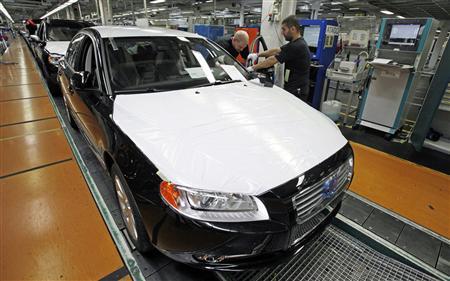Volvo to spend $11b over coming years
Updated: 2012-04-06 13:49
(Agencies)
|
|||||||||||
 Workers make final adjustments to a new car at the main Volvo car assembly plant in Gothenburg, in this file picture taken May 20, 2010. [Photo/Agencies] |
Swedish carmaker Volvo, owned by China's Zhejiang Geely Holding Group Co Ltd, plans to spend $11 billion on developing new products and boosting its manufacturing footprint in the next few years, a company spokesman said on Thursday.
Earlier in the day, German magazine Wirtschaftswoche said Geely would invest the money, but spokesman Per-Ake Froberg said that funding would come from Volvo itself and include financing from cash flow and borrowing.
"It is not Geely investing $11 billion," he said.
Geely took over Swedish premium brand Volvo from Ford Motor Co in 2010 in China's largest overseas auto acquisition, reflecting the country's rapid rise in the sector.
In a Reuters interview in February last year, Volvo CEO Stefan Jacoby said a five-year $10-11 billion investment plan would mean new products and factories in China to meet the goal of doubling sales to 800,000 units in 10 years.
It wants 20 percent of China's premium auto market by 2015.
The Wirtschaftswoche article quoted Geely president Li Shufu saying Volvo would use the money to build a new engine factory, beef up research and development and upgrade technology.
Volvo and Geely Automobile Holdings, also owned by Zhejiang Geely Holding, will also pool purchasing of parts and components and jointly develop small engines and technologies for electric vehicles, Wirtschaftswoche reported.
"We want to revive Volvo and give the brand its strength back,"?Li told Wirtschaftswoche.
Geely will develop a new premium brand for the mass market in China using Volvo technologies but the new brand will later be placed under Geely Automotive.
Volvo plans to increase Chinese deliveries to about 200,000 by 2014 from 47,000 last year, the magazine said.
- European investors cool toward China
- Filling China's insurance gaps
- HK wins Asia Pacific's top shopping spot
- Triangular debts threaten manufacturers
- New policies support ailing solar industry
- Scalpers cash in on short supply of iPhone 5s
- Lean times at Canton Fair
- China's crude steel output plummets in Jan-Sept












